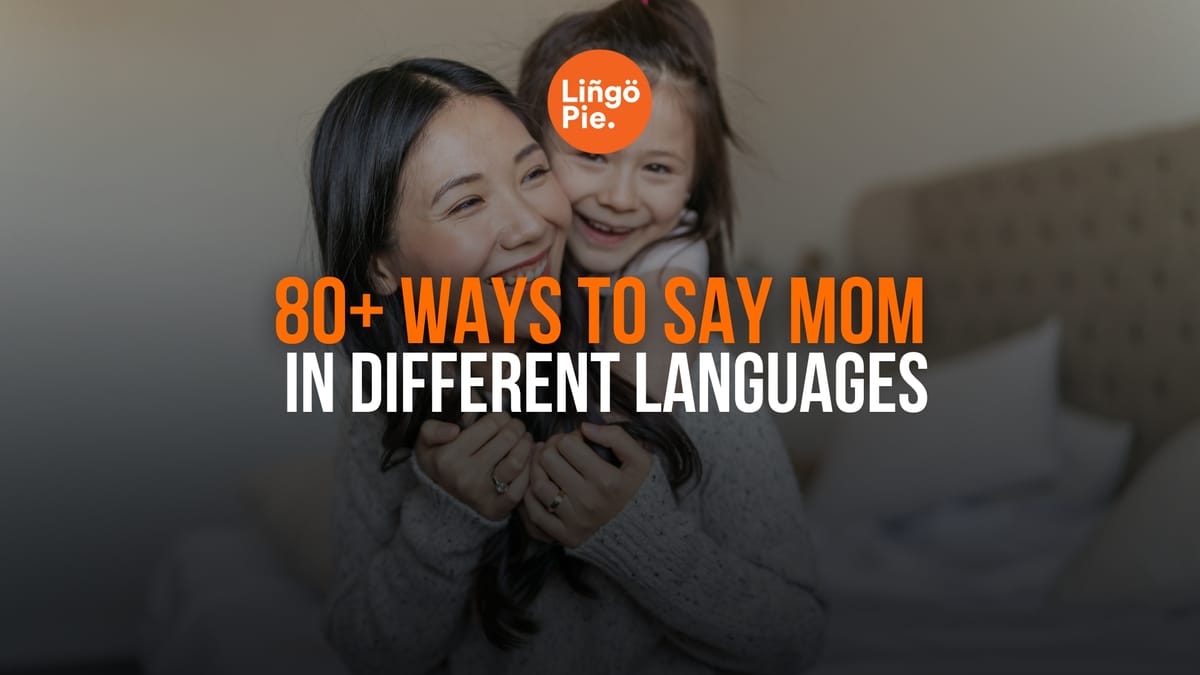Mother's Day is coming up, and while flowers and chocolates are nice, here's something that might surprise her even more: learning how to say "mom" in a different language!
To help you honor the most important lady in your life, this guide covers over 80 ways to say "mom" across different languages, giving you pronunciation tips and cultural context along the way. You'll discover not just the formal terms, but also the sweet nicknames and affectionate variations that the GenZs actually use in everyday conversation.
- Swiss German And German Language: 5 Major Differences
- 11+ Best Shows On Netflix To Learn Korean
- 17 Best Shows To Watch To Learn Spanish On Netflix

Mother In Different Languages
Mother In Western European Languages
Western European languages show both Latin and Germanic influences in their words for mother, often offering both formal and affectionate options that children can use.
- French: Mère (formal), Maman (affectionate)
- Italian: Madre (formal), Mamma (informal)
- Spanish: Madre (formal), Mamá, Mami, Mami
- German: Mutter (formal), Mama, Mutti
- Portuguese: Mãe
- Dutch: Moeder (formal), Mama
- Norwegian: Mor, Mamma
- Swedish: Mor, Mamma
- Danish: Mor, Mama
- Welsh: Mam
- Irish (Gaelic): Máthair
- Icelandic: Móðir, Mamma
- Finnish: Äiti
- Estonian: Ema
In French, the word for "Mother" is Mère, but many children use the affectionate Mama instead. Similarly, in Spanish, "Mother" is Madre. Children also use Mamá or Mami. There are also regional varieties, such as Amá in rural Mexico or Cuchita in Colombia.

Mother In Eastern European Languages
Eastern European languages often share Slavic roots, which creates interesting similarities while maintaining distinct cultural flavors.
- Russian: Мать (mat' - formal), Мама (mama)
- Polish: Matka (formal), Mama
- Czech: Matka, Maminka
- Slovak: Matka, Mama
- Ukrainian: Мати (maty), Мама (mama)
- Bulgarian: Майка (majka)
- Serbian: Мајка (majka)
- Croatian: Majka, Mati
- Bosnian: Majka
- Slovenian: Mati, Mama
- Hungarian: Anya, Fu
- Romanian: Mama, Maică
- Albanian: Nënë
- Lithuanian: Mama, Motina
- Latvian: Māte, Mamma
In Russian, "Mother" is мать (mat). Mom is мама (mama). More affectionate ways of saying Mom are мамочка (mamochka) and мамуля (mamulya).

Mother In Asian Languages
Asian languages demonstrate incredible diversity, from tonal languages like Chinese and Vietnamese to completely different writing systems like Japanese and Korean.
- Chinese (Mandarin): 母亲 (Mǔqīn - formal), 妈妈 (Mama)
- Japanese: お母さん (Okaasan), 母さん (Kaasan), ママ (Mama)
- Korean: 엄마 (Eomma), 어머니 (Eomeoni - formal)
- Hindi: माँ (Maa), मातजी (Mataji)
- Punjabi: ਮਾਂ (Maa), ਮਾਤਾ ਜੀ (Mataji)
- Bengali: মা (Ma), মাতা (Mata)
- Thai: แม่ (Mæ)
- Vietnamese: Mẹ
- Indonesian: Ibu
- Malay: Ibu, Emak
- Filipino (Tagalog): Ina, Nanay
- Khmer (Cambodian): ម្ដាយ (M'day)
- Lao: ແມ່ (Mae)
- Nepali: आमा (Aama)
- Sinhala: අම්මා (Amma)
In Chinese, the formal word for "Mother" is 母亲 (Mǔqīn), but most children just call their moms 妈妈 (mama). Meanwhile, the Japanese word for "Mother" is お母さん (Okaasan). Little children also use use 母さん (kaasan) or ママ (mama).

Mother In Middle Eastern & North African Languages
Middle Eastern and North African languages often blend ancient roots with regional variations, creating rich linguistic landscapes for expressing maternal love.
- Arabic: أم (Umm/Om), والدة (Walida)
- Egyptian Arabic: ماما (Mama)
- Levantine Arabic: ماما (Mama), مامي (Mami)
- Gulf Arabic: يُمّه (Yumma)
- Syrian Arabic: يوم (Youm), يامو (Yamo)
- Moroccan Arabic: لوالدة (Lwalida)
- Hebrew: אמא (Ima)
- Persian/Farsi: مادر (Madr), مامان (Maman)
- Turkish: Anne, Ana, Valide
- Kurdish: Dê, Dayik
- Azerbaijani: Ana
- Georgian: დედა (Deda)
- Armenian: Մայր (Mayr), Մամա (Mama)
In Modern Standard Arabic, the word for "Mother" is أم (Omm). Affectionate versions vary across the Arabic-speaking world. In the Levant, ماما (mama) or مامي (mami) are used. In Kuwait and Qatar, يُمّه (yumma) is used.

Mother In African Languages
Africa's linguistic diversity is stunning, with over 2,000 languages representing various language families from Afroasiatic to Niger-Congo.
- Swahili: Mama
- Amharic: እናት (Enat)
- Yoruba: Ìyá
- Igbo: Nne
- Hausa: Uwar
- Zulu: UMama
- Afrikaans: Moeder, Ma
- Shona: Amai
- Twi: Maame
- Fante: Na
- Ga: No, Maa
- Ewe: Dada
- Fulani: Yaay
- Wolof: Yaay
- Berber/Amazigh: Yemma
In Swahili, one of Africa's most widely spoken languages, mother is "mama," showing how some African languages also adopted this common sound. In Yoruba, mother is "iya," while in Hausa, it's "uwar."
Modern Variations & Nicknames
Common English Variations For Mothers
English speakers have developed numerous affectionate ways to address mothers, ranging from classic to quirky.
- Mom: Standard American term
- Mum: British variant
- Mama: Affectionate and southern US
- Mommy: Childish and endearing
- Mummy: British childish version
- Ma: Short and casual
- Momma: Southern US variant
- Mother: Formal term
- Mother Dear: Old-fashioned endearment
- Mumsy: British affectionate term
Trending Nicknames For Mothers
Social media and modern culture have introduced new nickname trends that reflect contemporary family dynamics.
- Mommy Dearest: Inspired by the classic film
- Mama Llama: Fun and rhyming
- Momster: Playfully acknowledging strong personalities
- Momaroni: Silly food-related play
- Momternet: For online-savvy mothers
- Mamarazzi: For mothers who love taking photos
- Mommy McLovin: Pop culture reference
- Mama Mia: Italian-inspired exclamation
- Momshell: Playing on "bombshell"
- Momtourage: For mothers with many children
Monica Mom references the meticulous and caring character from Friends, while Wonder Woman honors strong, justice-driven mothers. These nicknames often emerge from shared experiences, inside jokes, or cultural references that families enjoy together.
How To Greet Happy Mother's Day In Different Languages
Mother's Day is celebrated worldwide, though on different dates across cultures. In Thailand, for instance, Mother's Day coincides with Queen Sirikit's birthday on August 12, making it a national celebration of motherhood. In Mexico, families often gather for serenades and special meals, while in Ethiopia, the harvest season marks their Mother's Day celebration.
Here are the most popular ways to express this heartfelt sentiment across the globe's major languages:
- Spanish: ¡Feliz Día de la Madre! (feh-LEES DEE-ah deh lah MAH-dreh)
- French: Bonne Fête des Mères (bohn fet day mehr)
- German: Alles Gute zum Muttertag (AH-les GOO-teh zum MUT-ter-tahk)
- Italian: Buona Festa della Mamma (BWOH-nah FES-tah DEL-lah MAM-mah)
- Portuguese: Feliz Dia da Mãe (feh-LEES DEE-ah dah mah-EH)
- Chinese (Mandarin): 母亲节快乐 (Mǔqīn jié kuàilè)
- Japanese: 母の日おめでとう (Haha no hi omedetou)
- Korean: 어머니날 축하해요 (Eomeoni-nal chukha-haeyo)
- Arabic: عيد أم سعيد (Eid umm sa'eed)
- Hindi: माँ दिवस की शुभकामनाएं (Maa diwas ki shubhkaamnaayein)
- Russian: С Днём Матери (S Dnyom Materi)
- Dutch: Fijne Moederdag
- Polish: Wszystkiego najlepszego z okazji Dnia Matki
- Czech: Všechno nejlepší k svátku matek
Learn A Language With Lingopie
Now that you know how to say "mom" in dozens of languages, you might be thinking about learning one properly. Mother's Day is coming up—what if you actually learned enough to greet your mom in her native language? Even something basic like "Good morning, Mom" in Spanish or "I love you" in Italian would probably make her day.
If you're serious about learning, platforms like Lingopie let you watch real shows and movies while picking up the language naturally. You could start with family-focused content where you'll hear these "mom" words we talked about in actual conversations. It's way more interesting than textbooks, and you'll understand context better. Plus, your mom might enjoy watching along with you.
Give Lingopie a try now!
Frequently Asked Questions About Saying Mom in Different Languages
Why does "mama" sound similar in many languages?
"Mama" is one of the first sounds babies can make because the "m" sound is produced by closing both lips (called a bilabial sound), which is much easier than complex tongue movements. When babies babble and make "ma" sounds while nursing or wanting attention, caregivers naturally interpreted this as calling for mother.
What's the difference between formal and informal words for mother?
Most languages offer multiple ways to address mothers, from formal terms used in official contexts to casual nicknames used at home. For example, "Mutter" is formal German while "Mutti" is affectionate. These variations reflect social context—you might use formal terms when introducing your mother to strangers but switch to informal ones in family conversations.
Can I mix languages when talking to my mother?
Absolutely! Many multicultural families naturally blend maternal terms from different languages. It's common to hear children say "Merci, Mama" (mixing French and English) or use heritage language terms even if the family primarily speaks another language at home. This linguistic mixing shows cultural pride and family history.
Which language has the most unique word for mother?
While many maternal terms share similarities, some languages have fascinating differences. Finnish "äiti" and Hungarian "anya" stand out as completely different from the "mama" pattern. Regional dialects also create unique variations—Syrian "youm" and Moroccan "lwalida" show how Arabic dialects developed distinct maternal vocabulary.
Is it disrespectful to use casual nicknames for mother in some cultures?
Cultural norms vary significantly. In many Asian cultures, formal address shows respect, while Western cultures often embrace casual nicknames as signs of closeness. When in doubt, observe family dynamics and ask about preferences. What matters most is the love and respect behind the words, not the formality level.








![Qixi Festival Guide: Meaning, Traditions, and Chinese Love Vocabulary [Guide]](/blog/content/images/size/w300/2025/06/Qixi-Festival-Guide.jpg)
![How To Say Love In Different Languages [120+ Ways]](/blog/content/images/size/w300/2024/11/How-To-Say-Love-In-Different-Languages--120--Ways-.jpg)